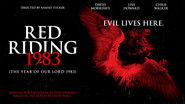Ava-Grace Willis
Story: It's very simple but honestly that is fine.
Kaydan Christian
A terrific literary drama and character piece that shows how the process of creating art can be seen differently by those doing it and those looking at it from the outside.
Quiet Muffin
This movie tries so hard to be funny, yet it falls flat every time. Just another example of recycled ideas repackaged with women in an attempt to appeal to a certain audience.
gavin6942
Plagued by guilt, a corrupt police official attempts to solve the case of a missing schoolgirl after seeing connections between her disappearance and a rash of prior abductions.In this final chapter to the Red Riding trilogy, we go back to the beginning. No longer are we concerned with the Yorkshire Ripper, but we go back to check on Andrew Garfield's journalist and why his investigation failed. We see the man who was wrongly accused and what had become of him... and just maybe we can now find the real culprit.For me, the first film in the series was the best. This may be the second best because it attempts to tie up some loose ends. The second film really seems more or less a place holder. Yes, it is part of the story and has some of the same characters (though not many), and yet I think it could be cut out more or less entirely and still we would have a coherent story.
CinemaClown
The final chapter of the Red Riding Trilogy, In the Year of Our Lord 1983 brings its crime & corruption saga to its conclusion and follows a corrupt police officer who's being plagued by guilt over his wrongdoings and decides to redeem himself by trying to solve the case of a missing girl after seeing connections between her disappearance & similar cases in the past.Once again employing the fractured narrative style, this third chapter does tie up the loose ends and brings its story & character arcs full circle but then, it also lacks the very sense of hurriedness that final instalments usually have for the pacing is slow and whatever secrets & mysteries are unraveled over the course of its runtime never really come off as shocking or surprising enough.The performances are a definite plus, the theme of redemption plays a big role and most of its character are finely handled but the whole experience of sitting through this trilogy still leaves a feeling of incompleteness for I expected a far more gripping story than what it had in store. If you enjoy slow-burners, then Red Riding Trilogy is worth checking out but it'd be better to go in blind & finish the trilogy in one sitting if you want the optimum experience.
samkan
Almost literally. In truth there are a few moments featuring outdoor scenes where the sun MIGHT be out amongst clouds, though camera and lighting do their best to avoid such potential charm. And therein are presented the underlying themes of evil, greed, debauchery, misery, hopelessness and...... did I mention....evil.The Red Riding Trilogy is a five hour adventure into a dark world of vile corruption, pedophilia, brutality, fear and futility. It is certainly not without merit. It features police corruption and brutality as well or better than anything I've viewed. (Example: When a mentally deficient character wets his pants upon sight of the cops we understand entirely his reaction.) The lead characters, arguably there are four, are so flawed that they function less as protagonists than as faint glimmers of humanity. Yet they are genuine to a fault. The bleak hopelessness of the British working class is well supported by the lighting, tinting (its neither color nor B&W) and drab settings. There is certainly a story in here somewhere, not so much moved by the characters as by the ugliness of human nature and it's ability to overwhelm the good.Rather than say the RRT would be better pressed into a single feature length film, the true merits of RRT would be better presented as a multi-part, episodic production more slowly introducing and intermingling the various characters. RRT is certainly more about characters and their natures, reactions and failings than anything else! As I mentioned before, only arguably have we four main characters. The story, quite artfully, ebbs and flows re the importance of and emphasis on certain people. A seemingly minor character is a plot devise at one point, only to be more fully drawn much later. An eight or ten part RRT, at an hour a shot, would/could provide something as engaging as ; e.g., a BBC Dicken's production. Imagine a modern day Bleak House adding drugs, sex, gruesome violence and overwhelming fear.The major problem with RRT is that what we ultimately learn to be the great evil has by then become so obscured by characters and emotions that it almost gives new definition to anticlimax. There may -or quite possibly may not - have been sufficient clues, dialog, etc. attending to the "story" to have made its outcome satisfying. Assuming there were enough such tips (this is arguable!) by the end of RRT the viewer is far too exhausted to piece the story together. In a nutshell, the backbone story/plot takes such a distant backseat to the grittiness, characters and tragedies that it will be long forgotten before RRT's fears and tears are still remembered.
kluseba
This third part of the mini series presents once more a different genre with this very insightful and philosophical conclusion. The movie is less darker and brutal than the first two ones and talks more about hope than desperation. The movie talks about moral, forgiveness and remorse and presents once more a few new and profound characters.The movie has three main actors and begins with the fact that another young girl has been kidnapped nine years after the last murder. The remorseful cop Maurice Jobson, played by the brilliant David Morissey, wants to stop the insanity and begins to question the corruption, the violence and lies within the police. He falls in love with a clairvoyant and wants to save the kidnapped girl with her while his partners try to find a scapegoat for the new crime. He realizes that he has done some mistakes in his life and wants to change. He is now looking for forgiveness, truth and justice.The second main character is the fat and disillusioned lawyer John Piggott, played in a rather mediocre way by Mark Addy, whose father was one of the corrupt police officers that has been killed in mysterious circumstances, helps after much hesitation the mothers of the two scapegoats that are or have to go to prison for crimes they didn't commit.The third main character is the young and homosexual BJ, brilliantly played by Robert Sheehan, who has escaped from Torkshire and travels around the country to come back for a last act of vengeance.All those three characters come together in a grand finale. But before this conclusion, the story meanders back and forth through space and time and creates connections to the first two movies and even new connections beyond that. Those scenes help to create once more some very diversified and profound characters but it is sometimes difficult to follow this pattern and to understand what is happening right now or in the past. There are many flashbacks and changes of space and time in the movie and that makes it less dynamical and intense to watch than the first two ones. The strong point of the movie are the interesting characters and the fact that many points are explained and many questions are answered to that haven't been before.But I still felt disappointed about the conclusion. It seems too simple to me and I would have liked to have some more original explications, for example concerning the connection of the businessman Dawson to the murders.Because of the conclusion and less intense atmosphere, this third part is the weakest one of the series in my opinion. But I still gave seven stars because of the interesting characters and the fact that almost everything is explained in the conclusion of the movie. The philosophical style of this movie is very interesting but I preferred the drama style of the second or the first movie that was a great film noir and my favourite part of the series.All in all, this trilogy is interesting to watch and really presents three different kinds of a movie and creates connections in between them in an interesting way. Artistically, those series are really well done and most of the actors did an amazing job. But there is a lack of suspense in this slow paced series and the criminal investigations are rather boring. It was a good idea to watch the series, but honestly, I wouldn't but it or watch it again for a while.1974: 7,5 stars 1980: 7 to 7,5 stars 1983: 7 stars





